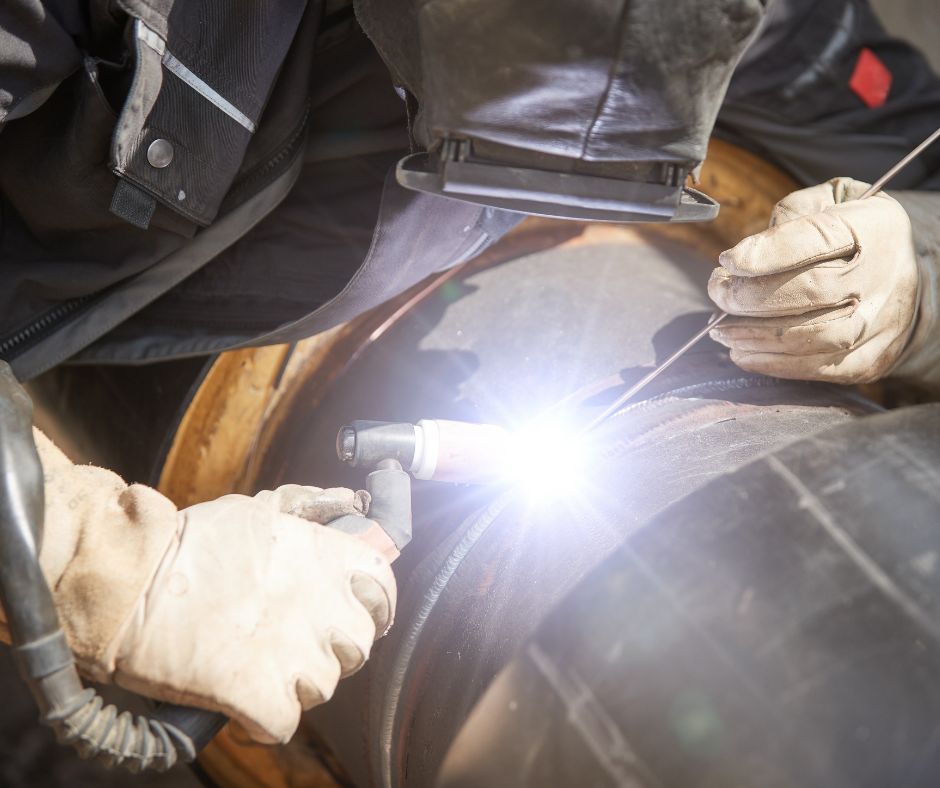Welding is essential to countless industries. From the cars we drive to the bridges we cross, welders use skill and precision to join metal and create durable and lasting structures.
Exploring welding careers can open doors to exciting opportunities, steady work, and the satisfaction of building something tangible.
Stratford Career Institute offers a flexible online welding course to help you take that first step. This course introduces the knowledge needed for the trade, including welding terminology, essential safety practices, and different welding processes. It is a foundation course meant for career exploration, and does not grant credit or certification.
Read on to learn more about different welding jobs, educational requirements, salary, and career outlook.
What Types of Welding Careers Exist?
The term “welder” covers various specialized roles with unique duties and environments. Your interests and skills can shape your career path and lead you to jobs, including the following:
- Structural welder,
- Pipe welder,
- Underwater welder,
- Aerospace welder,
- Welding inspector, and
- Welding engineer.
With many specialized paths available, you can find a welding career that fits your interests and long-term professional goals.
What Are Typical Welding Job Responsibilities and Daily Tasks?
A welder’s daily tasks can be diverse, depending on their specialization. The core welding job responsibilities, however, remain consistent across most roles. They include:
- Reviewing blueprints and project specifications;
- Selecting appropriate equipment and materials;
- Preparing metal surfaces;
- Creating strong, clean joints;
- Inspecting their work; and
- Maintaining equipment and ensuring a safe workspace.
A welder’s work requires focus and dedication to safety. The ability to perform these tasks with precision is what separates a good welder from a great one.
What Education Do I Need to Pursue a Welding Career?
A high school diploma or a GED is the general requirement for most welding jobs and is generally the first step toward a career. From there, you can choose from different educational paths:
- Vocational school program. These programs typically offer hands-on training and a structured curriculum that prepares you for certifications. They can range in length from a few months to a year or two.
- Apprenticeship. Another option is an apprenticeship, which combines paid on-the-job training with classroom instruction under a mentor. These programs can take a few years but offer the benefit of earning a living while you learn.
- Certifications. After vocational school, a college program, or an apprenticeship, certifications can help with career advancement and job opportunities.
For those who want to learn about the welding field before committing to a longer, more intensive program, an introductory course can be beneficial.
Stratford Career Institute’s online welding course is designed for this purpose. It provides a foundational understanding of welding terminology, safety practices, and welding processes. It is a way to explore a career and gain the basic knowledge needed for further hands-on training or an apprenticeship.
Frequently Asked Questions
Here are some often asked questions about pursuing a welding career.
What Is a Welding Engineer’s Salary?
Welding career salaries can vary based on experience, location, and specialization. The Bureau of Labor Statistics reports that the median pay for welders, cutters, solderers, and brazers was $51,000 per year or $24.52 per hour in 2024. As with other specialized welder roles, a welding engineer’s salary is often higher because they require a more advanced skill set and greater duties.
What Is the Career Outlook for a Welder?
The career outlook for welders is projected to grow 2 percent from 2023 to 2033. This growth is considered slower than average compared to other job industries. However, thousands of job openings will still occur annually as experienced welders retire or move to different occupations.
Weld specializations and certifications can help you stand out from the applicant pool, making you a more attractive candidate to employers and improving your chances for a higher salary.
What Skills Do I Need to Be a Welder?
Becoming a successful welder requires a combination of technical and personal skills, such as:
- Attention to detail,
- Physical stamina and dexterity,
- Commitment to safety, and
- Problem-solving skills.
These skills are essential for mastering the craft and maintaining a safe and productive work environment.
Start Your Welding Education with Stratford Career Institute
A career in welding can offer stability, growth, and the satisfaction of a job well done. Our welding course can be a perfect starting point.
Stratford Career Institute’s curriculum gives you the foundational knowledge to understand the trade, its terminology, and essential safety practices at your own pace. Learn the basics from the comfort of your home and prepare yourself for the next stage of your education.
Contact us to speak to admissions or enroll online today.


